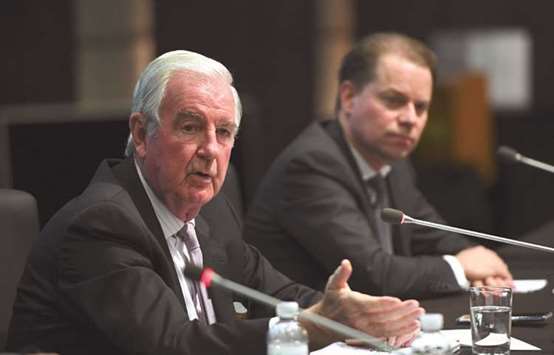Minister says WADA demands have ‘political character’, Kremlin says decision ‘unfair’
The World Anti-Doping Agency (WADA) said yesterday that Russia remains “non-compliant” with its Code, dealing a major blow to its hopes of being cleared to compete at February’s Winter Olympics.
Russia’s anti-doping agency (RUSADA) has been suspended since a 2015 WADA report found evidence of state-sponsored doping and accused it of systematically violating anti-doping regulations.
WADA set out a roadmap for Russia to regain its status but at a meeting of its Foundation Board in Seoul yesterday decided that key criteria had not been met.
WADA president Craig Reedie said the Board approved the recommendation by the Independent Compliance Review Committee that RUSADA remain non-compliant as two key requirements for reinstatement had still not been fulfilled.
“Having set a road map for compliance, there are two issues that have to be fulfilled and we can’t walk away from the commitments,” Reedie told reporters, adding that the RUSADA has made improvements.
Kuwait, Equatorial Guinea and Mauritius had also been found non-compliant by the Board, it added.
The decision is likely to add more pressure on the International Olympic Committee (IOC) to ban Russian athletes from the 2018 Winter Games.
The Kremlin slammed WADA’s decision as unfair, insisting Russia did not have a state-sponsored doping programme.
“We do not agree with such a decision,” Kremlin spokesman Dmitry Peskov told reporters.
“We consider it unfair and we have denied and categorically deny accusations that the use of doping had state support. This is out of the question.”
Russia escaped a blanket ban at the 2016 Summer Olympics in Rio de Janeiro but remains barred from competing in international athletics events.
Yuri Ganus, director general of RUSADA, said the agency had done everything it could to be reinstated apart from two criteria that had not been met and were out of its control.
“We fulfilled all the criteria that depended on us,” Ganus told a news conference in Moscow. “There were two points that were beyond our prerogatives. Unfortunately they were not fulfilled.”
He did not say what they were specifically but Russian authorities have so far refused to acknowledge the findings of the 2015 report of state-backed, systematic doping. Russia has also not released stored samples from its Moscow lab.
The IOC is set to decide on Russia’s participation at its executive board meeting on December 5-7. “The decision of the IOC Executive Board ... will take all the circumstances, including all the measures to ensure a level-playing field at the Olympic Winter Games 2018, into consideration when it decides on the participation of the Russian athletes in Pyeongchang,” an IOC spokesperson said.
“The pre-games task force (set up by the IOC) will continue to ensure that all athletes eligible ..., and specifically Russian athletes, receive the appropriate level of testing.”
Pyeongchang Games organisers said they would await the IOC’s ruling next month.
Countries and sports federations must be compliant with the WADA Code to be eligible for the Olympics, with the IOC making the ultimate decision on participation.
The IOC banned six cross-country skiers this month as part of an investigation into allegations of widespread doping and sample-tampering by laboratory and security officials at the 2014 Sochi Games.
‘POLITICAL CHARACTER’
Russian Sports Minister Pavel Kolobkov hit out at the WADA decision, saying some of the criteria for RUSADA’s reinstatement had a “political character,” R-Sport news agency reported.
On Wednesday, Kolobkov had said Russia had done everything in its power to get reinstated.
A 2016 report by Canadian lawyer Richard McLaren found that more than 1,000 Russian competitors in more than 30 sports were involved in a conspiracy to conceal positive drug tests over a five-year period.
WADA said last week that it had obtained a database confirming the allegations of widespread state-sponsored doping made in the McLaren report.
Despite repeated calls for co-operation with international bodies to help rid Russia of doping, local authorities have never acknowledged any state involvement.
Russian President Vladimir Putin has suggested the allegations were an attempt to sow discontent ahead of Russia’s presidential elections.
Alexander Zhukov, president of Russia’s Olympic Committee, said yesterday they could not meet any criteria that called for the country to accept that the state was involved in doping.
“There was not and is no system of state support (for doping) in Russia,” the Interfax news agency quoted Zhukov as saying yesterday.
“This cannot be accepted.”

World Anti-Doping Agency (WADA) president Craig Reedie (left) speaks as WADA director general Olivier Niggli looks on during a press conference after the WADA’s foundation board meeting in Seoul yesterday. (AFP)
